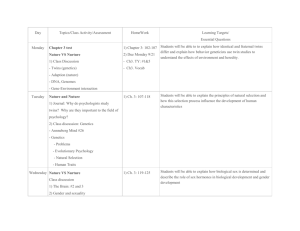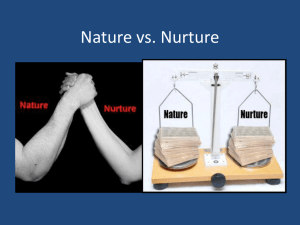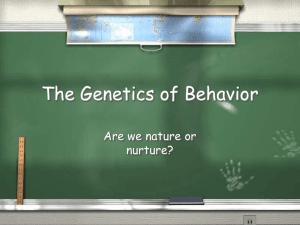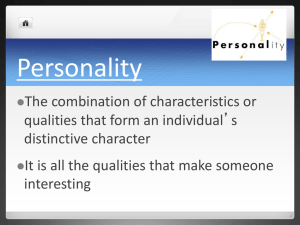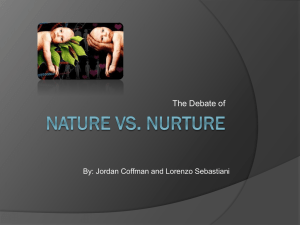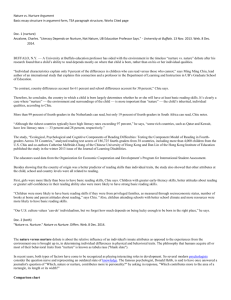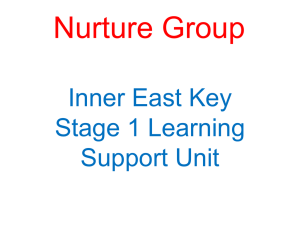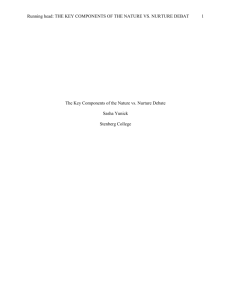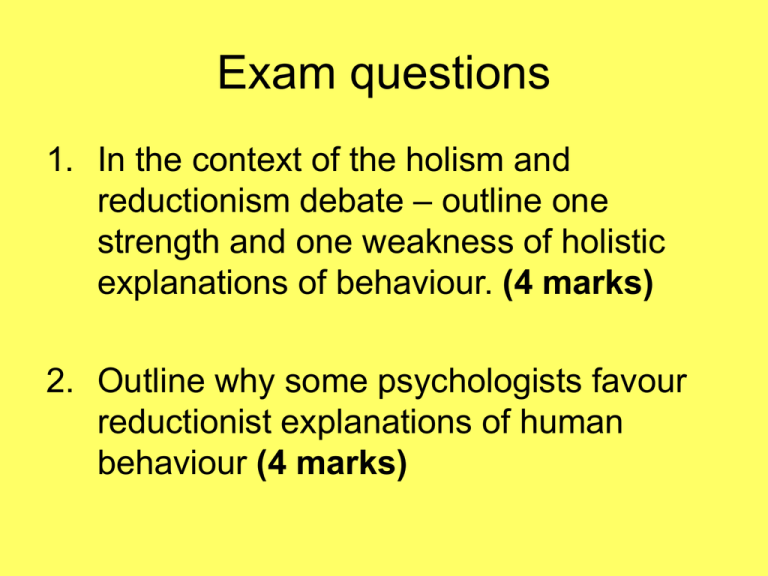
Exam questions
1. In the context of the holism and
reductionism debate – outline one
strength and one weakness of holistic
explanations of behaviour. (4 marks)
2. Outline why some psychologists favour
reductionist explanations of human
behaviour (4 marks)
Try to identify for each characteristic below, the general
view in society of the extent to which each results from
nature, or nurture or an interaction of both.
Extroversion
Eye colour
Eye sight
Aggression
Weight
Motivation
Background?
• Thompson and Venables grew up in circumstances
which had both striking similarities and profound
differences. Both boys had parents who had separated;
each had difficulties with attendance, learning and
behaviour at school. They bunked off, they shoplifted,
they were violent; all these pieces in a pattern that made
up a pair of empty, broken young lives. Ann Thompson
was portrayed as an incompetent alcoholic, while Susan
Venables was painted as a loose woman whose
neighbours "noted a procession of men friends for Mrs
Venables".
Personality
Neighbours told of pigeons having their
heads shot off with an airgun, of rabbits
being tied to railway lines, of dawn
rollerbooting sessions. There were tales of
charity collection boxes being stolen and of
children being assaulted in the classroom.
Background
•
•
•
•
•
mixed-race heritage, once insecure about his place in the world,
His mother Ann Dunham, a white woman originally from Kansas and the most
important influence on the future President's life. she was good fun, extremely
hardworking and had a great sense of humour," "She was also serious about giving
young Barack the kind of start in life that might help him succeed." Ann had met and
fallen in love with a handsome Kenyan student at university, Barack Obama, and they
were married. It was a time of racial tension in America in the early 1960s and with
mixed marriages outlawed in more than half the states of the union, though not in
Hawaii.
Ann was anxious to instil in her son a sense of self worth, that he should never be
ashamed of who he is. He was woken up at four in the morning," Alice told me, "so
Ann could home school him, so that he could get the kind of education that would
give him a chance to help people, and it worked."
The self confidence and belief in his own abilities that have helped shape Barack
Obama's destiny, were the fruits of a doting mum. a shocking revelation for the son
when he made an emotional pilgrimage to Kenya in the late 1980s. He found that the
father whom he had placed on a pedestal had died a washed-up drunk, bitter and
alone.
The younger Obama has written about how he sat by his father's grave and wept,
vowing never to make the same mistakes, that he would not to squander his life.
Experiences
• Political motivation
His closest friends and colleagues during his time as a community organiser in
the poor, deprived Southside area of Chicago, the period in his life when he
realised his future was in politics, say that Obama never forgot the conflicts
of his mixed race heritage.
Gerald Kellman gave Obama the job in Chicago and told me Obama identified
with other outsiders.
"And that was a good connecting point for people who were poor," he said.
"People who faced racial discrimination - it helped him identify with their
lives."
During Obama's time at Harvard some black students thought he was a sell out
when he reached out to whites on the Harvard Law Review.
Later on, the fall-out of the Reverend Wright affair threatened to bring him into
conflict with the African-American community. And despite the seemingly
effortless political ascent there was an election defeat along the way, to
former Black Panther and congressman Bobby Rush.
Obama learned some fundamental lessons from this defeat, lessons that made
him a stronger campaigner and political operator
• Michael Jackson
Between his terrifying plastic surgery and legal woes, Michael
Jackson has plenty of problems — some of which he blames on his
father, Joe Jackson. Michael says that as the starring member of his
family's famous musical group, the Jackson Five, he never had a
childhood, and that his father beat him into working harder. While
certainly his father's discipline helped propel the group, and Michael,
into international stardom, Jackson has said in the past that just
thinking about his dad makes him want to throw up. Joe may also be
the catalyst for Jacko's cosmetic surgery O.D. — the troubled pop
star says his father criticized him for having a "big nose." The nose
is "fixed," so to speak, but not the relationship. Nonetheless, both his
mother and father supported him after he was charged with
molesting children.
Heredity – Environment debate
Nature – Nurture debate
Nativism – empiricism debate
What do we really mean by nature?
• Inheritance, the genetic material that is passed from
parents to offspring causes psychological characteristics
to be developed. Usually the focus is on how these
cause individual differences as opposed to what makes
humans different from other animals but it can mean
both.
• For example, the ability to be able to use language
occurs with only the bare minimum of environmental
factors present, i.e. other language users around, and so
it can be said we use language naturally. However, how
good we are at this compared to others may be due to
environmental factors as well as genetics.
What do we really mean by
nurture?
• Experiences and learning that takes place after
birth is what causes psychological
characteristics to be developed. As the famous
quote by Watson goes “Give me 12 dozen
healthy infants and I will raise them to be a
doctor, lawyer or even a thief”
• Of course we know now it isn’t as simple as this,
pre natal experiences can also have an effect on
the development of an individuals development.
Nativism – Rene Descartes 1600’s
• He believed all our behaviours
are innate – he believed we
were born with some aspects of
knowledge, i.e. God. At this
time so it was believed that not
genes caused our behaviours instead our human
characteristics and knowledge
was simply what it was to be
human.
• Of course now we know
about in genetic influences
and how certain
characteristics are heritable.
Empiricism – John Locke 1600’s.
• He was of the view
that at birth the
human mind is a
‘tabular rasa’ (blank
slate) which is filled
through learning and
experience. Your
thoughts, behaviours
and personality etc…
The question is then…
How much do each debate contribute to our
understanding of human behaviour?
Interactionism
• It seems impossible to separate the two, nor does it
make sense to adopt extreme positions of either simply
environment or heredity - instead we should
acknowledge how both interact in a complex way.
• Nature is expressed in nurture, i.e. genes for walking on
two legs, using our lungs to breathe in oxygen, etc
…both are necessary for us to survive.
• Can you think of more examples of nature expressed in
nurture from the topics you have studied?
Interactionism
• Each individual is a unique genetic mosaic
(Tavris and Wade, 1995) with unique
experiences in history…
• Thus a genius at playing the violin could be to
do with a number of factors, inherited musical
talent, raised by a musical family or inspiration
from a opera at an early age…..It could be more
of one or all of the above….
Methods of investigating the
contributions of nature nurture…
• Heritability;
– Twin studies are used to determine a
heritability estimate
– Heritability estimate – a statistical estimate of
the variance of a trait within the whole
population and the extent to which that trait
can be attributed to genetics.
Support for Nature
• PKU – phenylketonuria:
This is an inherited metabolic disorder
where certain proteins are not processed
properly which leave a poisonous substance
in the blood that can cause brain damage.
However
• If PKU is detected early (and all newborns
are tested) then the particular proteins ca
be eliminated from the child’s diet and
there is no brain damage. Thus if the
childs environment contains no proteins,
no damage will occur. Thus this is an
interaction of NN.
Support for Nature
• Gibson and Walk (1960) showed in their
classic ‘visual cliff’ experiment that baby
infants are born with innate depth
perception. Infants who had just began to
crawl with no previous experience of
falling off a flat surface into a deep space
would not crawl onto the clear glass which
gave the perception of a deep hole.
Evaluation
• The infants in this study were 6months old
and so may have experienced aspects of
depth perception that the parents did not
tell the researcher – and so we can never
be sure if depth perception is purely
innate.
Support for Nature
• The degree of similarity between MZ twins
compared to DZ twins is a clear indicator of a
genetic influence. Twin studies by Gottesman
(1991) has shown this for sz, intelligence and
temperament.
• Bouchad and Mc Gue (1981) found that when
pairs of MZ and DZ twins have been reared
apart higher concordance rates were still found
for MZ twins.
however
• High concordance rates may be due to
similar upbringings. For example,
Schiffman et al (2002) found that it was
commonly found that parents of sz clients
had three characteristics in common, high
levels of family conflict, difficulties with
communication and parents are usually
highly critical of their children. So maybe it
is these reasons for SZ not genetics.
Howevers….
• Plomin et al (1997) showed that
personality characteristics such as
neuroticism and assertiveness have a
heritability coefficient between 0.15 and
0.50. If a value of 1 means the trait or
characteristic is determined solely by
genetics and a value of zero that genetics
plays no role then what does this mean?
howevers
• There is no such thing as pure nature. People
argue that abilities present at a babies birth is
nature, but by this time the baby has already had
9 months worth of experience in the womb.
• Even before conception the state of the infant is
not all nature as illustrated by something called
the ‘transgenerational effect’;
• Thus genes can be modified by the state of the
mothers physiological state known as the ‘3 D’s
– disease, drugs and diet.’
3 d’s
• Rubella – if mother contacts disease in first
month of gestation can lead to problems with the
babies ears, heart and eyes. Deafness is
common…
• FAS Fetal Alcohol Syndrome – a baby of an
alcoholic mother will generally be smaller than
other babies, have smaller brains, heart defects
and low IQ scores.
• Poor diet – malnutrition – increase chances of
still birth, low birth rate and stunted growth etc
Implications
• If genes are largely implicated in differences
between the intelligence of individuals the this
could have major implications on whether it is
even worth investing time and resources into
enrichment programmes.
• If nurture (the family) is implicated as the cause
of sz then this points the blame and guilt at them
Evaluations
• Twin studies are a form of natural experiment. The
genetic relatedness and environmental conditions are
not controlled by the experimenter. It is therefore very
difficult to establish a cause and effect relationship.
• Be absolutely clear about the meaning of heritability.
These estimates do not apply to individuals but instead
to variations within a group. Journalistic accounts of
behavioural genetics research overlook this fact. For
example the Times article on heritability of intelligence –
a passage read “…how much of an individuals
personality is to do with heredity?....about half”. Clearly
this is not true.
homework
1. Explain the nature nurture debate in
psychology (4 marks)
2. Choose a topic in psychology in which
the contributions of nature nurture have
been investigated. Briefly discuss the
nature side of the argument (4 marks)
Answer 1
AOl One mark for outlining the term nature; genes, innate
or inherited factors. One mark for outlining the term
nurture; environment, experience.
AO2 Marks to be awarded for explaining the debate; a
controversy within psychology that is concerned with the
extent to which particular aspects of a behaviour are a
product of either acquired or inherited characteristics.
A further mark for an expansion. Most likely expansions will
be areas of controversy such as intelligence
(explanations of differences between individuals) or sex
role (genes and hormonal influences or socially
constructed and reinforced). Marks can be gained for
information as to the roots of the debate; nativist
philosophy vs empiricism or implications of the debate.
Answer 2
• Genetics study….

